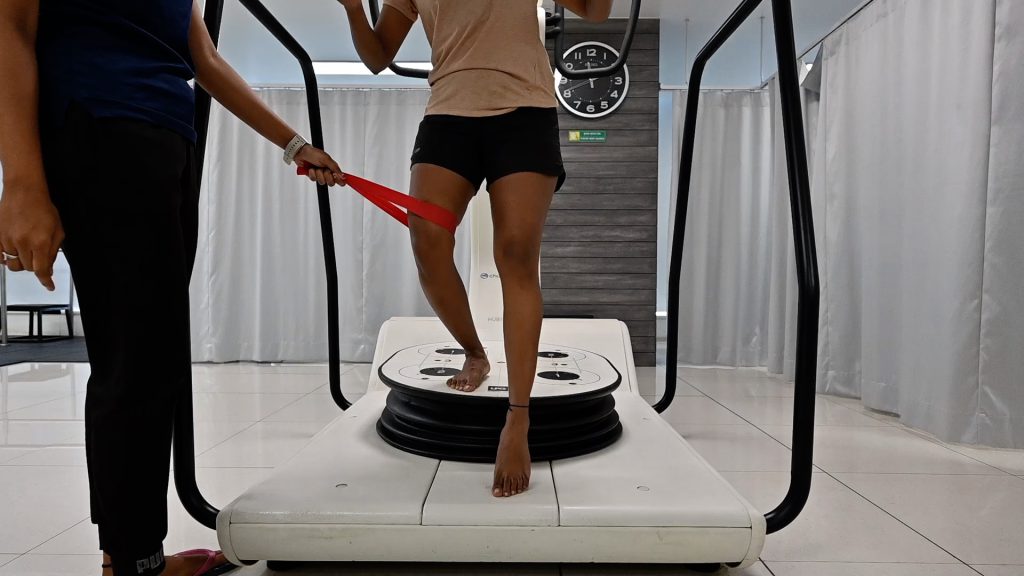Travel is one of life’s greatest pleasures. Whether it’s a short getaway or an international adventure, exploring new places refreshes the soul. However, the challenges our bodies face during travel differ with age—and they can often turn a dream trip into a discomfort-filled ordeal. The good news? Physiotherapy can help you overcome these hurdles so you can say Bon Voyage! with confidence.
Age-Related Travel Challenges
Children and Teens: Young travelers are energetic, but long hours of sitting during flights or road trips can cause restlessness, stiffness, and even early back pain. Sports injuries are also common during active holidays.
Adults (30s-50s): This age group often faces challenges like neck and lower back pain, shoulder stiffness, and knee discomfort, especially when carrying luggage or walking long distances. Prolonged sitting during travel can worsen conditions like sciatica.

Seniors (60+): Older travelers may experience joint pain, reduced balance, and increased risk of falls. Swelling in the legs (edema) and stiffness from arthritis can make walking tours and long-haul flights difficult. Additionally, balance issues make navigating crowded airports or uneven terrains risky.
How Physiotherapy Helps You Travel Pain-Free
Physiotherapy is not just for injury recovery—it’s your passport to pain-free, smooth travels at any age. Here’s how:
- Pre-Trip Conditioning: Strengthening key muscle groups, improving flexibility, and enhancing balance to prepare your body for the physical demands of travel.
- Pain Management: Targeted therapies to reduce existing pain from conditions like arthritis, frozen shoulder, or sciatica.
- Swelling Control: Techniques to manage edema, especially helpful during long flights.
- Post-Trip Recovery: Releasing tight muscles, correcting posture, and addressing any pain or stiffness that arose during your trip.
Advanced Physiotherapy Treatments to Boost Travel Fitness
At our clinic, we use state-of-the-art technologies to help patients get travel-ready and recover smoothly post-trip. Here’s how:
Shockwave Release Therapy: This non-invasive treatment helps in breaking down scar tissue, relaxing tight muscles, and improving blood flow. It’s especially effective for chronic heel pain (plantar fasciitis), shoulder stiffness, and lower back pain—all common travel complaints.

HV (High Voltage) Combo Therapy: A combination of electrical stimulation and ultrasound, HV Combo reduces pain and inflammation while promoting faster tissue healing. It’s excellent for knee pain, neck stiffness, and managing swelling before or after a journey.
HUBER 360 Balance Trainer: Balance is crucial, especially for older travelers. The HUBER machine uses multi-directional movement and biofeedback to improve core strength and stability. This minimizes fall risks while navigating airports, cobbled streets, or hiking trails.

Why Pre and Post-Trip Physiotherapy Matters
Before the Trip:
- Strengthen weak muscles (like the core and glutes) to handle luggage and long walks.
- Stretch tight areas (like the calves and hip flexors) to prevent cramps.
- Balance training with HUBER to reduce fall risks.
- Pain relief through Shockwave and HV Combo so you start your trip fresh.
After the Trip:
- Release muscle tightness caused by prolonged sitting or overuse.
- Treat any pain or swelling that developed during travel.
- Realign posture and correct imbalances.
- Gradual reconditioning if the trip involved extra physical strain (hiking, trekking, etc.).
Do’s and Don’ts of Traveling: A Physiotherapy Guide
Do’s:
- Do regular stretching during long flights or road trips to prevent stiffness.
- Do use proper luggage with wheels to avoid unnecessary strain on your back and shoulders.
- Do wear supportive footwear, especially if your trip involves lots of walking.
- Do perform simple ankle pumps and calf stretches to prevent leg swelling.
- Do schedule a pre-travel physiotherapy assessment to address any underlying issues.
Don’ts:
- Don’t sit in one position for too long; change posture every 30-60 minutes.
- Don’t ignore early signs of pain or swelling while traveling—address them promptly.
- Don’t over-pack; carrying heavy bags can trigger or worsen pain.
- Don’t skip your prescribed home exercises while traveling.
- Don’t walk on uneven surfaces without proper balance preparation, especially if you have joint issues.
Testimony: Pain-Free International Travel at 41!
“I visited this Physiotherapy clinic for disc degenerative changes in my spine. When I got to know about this condition, I was relying on allopathy for treatment and unfortunately all doctors were discussing about what all restrictions I need to follow in day to day routine. I had zero knowledge or experience about physiotherapy. One of my friend suggested to visit this clinic for an opinion.
Never thought it can get so better with physiotherapy. It was very helpful for pain management. My work involves lot of travel and I was not sure if I will be able to do it anytime soon.
To my surprise, within one week of session, Dr.Tanmayee and Dr.Shreya advised that I can continue with travel plans as far as I’m regular with my exercise routine. I was extremely happy as this was not expected in near future.
Within few weeks I got such a relief that I could get back to my daily routine. Thanks to both, Dr.Tanmayee and Dr.Shreya for your help and expertise. Without you I won’t have been able to get back on track so fast. Highly recommend physiotherapy centre in Pune”
– Mr. Rajkiran Bidkar
Ready to Say Bon Voyage?
Don’t let pain or physical limitations clip your wings. Whether you’re planning a weekend getaway or a world tour, physiotherapy can make your trip comfortable and injury-free. Book your pre-travel physiotherapy assessment today! Let’s get you ready for the adventure of a lifetime!
-Dr. Tanmayee Pore
Musculoskeletal Physiotherapist
Rehab Station, Pune

